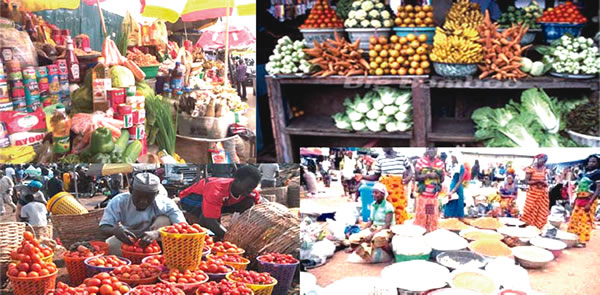
In this report, AKIN ADEWAKUN re-examined the federal government’s decision on food importation.
THE decision of the federal government to give a 150-day duty-free import window for food commodities has continued to elicit reactions from Nigerians, from different sectors of the nation’s economy.

As part of its response to the crippling food inflation being presently witnessed in the country, the federal government recently announced a temporary suspension of duties, tariffs and taxes, for the importation of food commodities, such as maize, husked brown rice, wheat, and cowpeas, through the nation’s land and sea borders.
Interestingly, not a few see the recent ‘fire-brigade’ approach of the government as not unconnected with the developments in the nation’s markets, in the past few months, which revealed an inflationary surge, particularly in food prices, and, in consequence, posing a significant challenge to the economic well-being of Nigerians.
For instance, in June 2024, headline inflation accelerated to 34.19 percent, as against 33.95 percent recorded in the previous month and 22.79 percent in the corresponding month of 2023, thereby implying 0.24 percent and 11.40 percent points higher, respectively. Food inflation in June also soared by 40.87 percent from 40.66 percent in May on a year-on-year basis, implying a 0.21 percent rise.
While some stakeholders agreed that the government’s decision has become imperative, albeit temporary, to make food affordable and check the obvious hunger in the land, not a few however argued that besides being unsustainable, such decision is not without its dire consequences for the huge investments that have been made in that sector in the past few years.
For instance, in its reaction to the decision, the Lagos Chamber of Commerce and Industry (LCCI), has described the federal government’s decision as ‘not out of place’, since the nation’s inflationary surge, particularly food prices, poses a significant challenge to the economic well-being of Nigerians.
While commending the decision, the Chamber, through its President, Mr Gabriel Idahosa, however, urged the government to focus more on boosting the supply side and drop the idea of a recommended retail price for food items but allow demand and supply factors to always determine prices, as obtained in a free market.
“While we support promoting and empowering local production, emergency interventions like this are not out of place since they are meant to fill a gap that local production capacity cannot achieve in the short term”, the Chamber stated.
Temporary movement to nowhere
But, an economist, public affairs analyst and Chief Consultant of B. Adedipe Associates Ltd, Dr. Biodun Adedipe expressed concerns that the nation is going back to food importation which it seemed to have gone beyond, years back.
According to him, though a highly volatile space, the nation’s agriculture sector has been fairly stable since 2018, and has been consistently contributing its quota to the nation’s Gross Domestic Product (GDP), since then.
For Adedipe, the decision may reverse this trend, and whatever gains that must have been made in the sector in the past few years.
Adedipe also finds an ally in the Deputy Chairman, All Farmers Association of Nigeria (AFAM), Lagos Chapter, Mr. Shakin Agbayewa, in this position, who believed the country is at cross roads, regarding how to tackle the present food inflation.
Agbayewa would simply prefer to see the policy as an unsustainable stop-gap measure, which may lead to nowhere at the end of the day.
“Yes, I believe food items are very expensive in the market, and the government has to urgently do something about it; since no responsible government will fold its arms and watch its citizens experience hunger, as we presently do in Nigeria. But the question is; after the 150-day window, what next?”, he stated.
Besides, the AFAM Deputy Chairman, Lagos Chapter, stated that substantial investments have been sunk into the sector in the past few years, adding that such investments may be ruined by this policy pronouncement.
“Remember there are farmers, and investors that have gone as far as taking loan facilities to cultivate farm rice and other commodity farms in the past few years. With this sudden influx of these food items, what becomes of those investments? Is this not capable of dampening the morale of prospective investors that may want to invest in that sector, too?” he asked rhetorically.
Policy won’t drive price of foodstuffs down
Toeing the same line of argument, a financial expert, public affairs analyst and Chief Executive of Wealthgate Advisor, Mr. Biyi Adesuyi, would want Nigeria to be cautiously optimistic about the policy, since it may not really drive down the cost of food items in the market.
According to him, the value of the nation’s currency against the dollars is abysmally poor, and since the foreign commodities will be bought in dollars, they may not be that affordable on getting to the market.
“The policy does not solve any problem. The food items will still be expensive, since they are going to use dollars to buy them. The value of the dollar was slightly over N400 when Buhari was leaving, now it’s at N1,500, a difference of N1,100 on top.
“So when you import, will the cost of the food not be almost triple, because you won’t use naira at the international market to buy the items, and because the naira has been so much undervalued? So what type of food will you import that will be cheap?
“Remember you will also pay for freight, shipping, then logistics, and distribution across Nigeria, when the commodities eventually arrive. So how will it be cheap when naira has not appreciated? As long as the Naira has depreciated so much, there is nothing they can import that will be cheap,” Adesuyi stated.
Right policies will restore health of the economy
Despite the obvious gloom, there seems to be a flicker of hope, if the right policies are in place, the stakeholders stated.
They stressed the need for the government to be decisive in its handling of insecurity, saboteurs within the space, and provision of incentives to investors in the sector. Government, they added, must think out of the box, too.
For instance, the LCCI would want to see more direct and targeted interventions, focused on agricultural mechanisation, agricultural research, the adoption of lower import duty exchange rates used to import agricultural input and the establishment of more functional agro-industrial hubs across the country.
It also urged the federal government to invest more in building the required infrastructure to drive the deployment of Compressed Natural Gas CNG-powered transportation. This, it stated, has the capacity of driving down transport cost; since it is seen as cheaper than petrol.
“We, therefore, need the basic infrastructure, which is charging facilities for the vehicles,” the Chamber stated.
The group also urged the government to consider smallholder farmers and vulnerable groups, including women and youth, for targeted assistance.
Besides, it recommended that the government should promote the integration of fertilizer distribution with other agricultural value chain interventions, such as improved seeds, irrigation, and post-harvest management.
“Government should support the development of local fertilizer production capacity to reduce import dependency and enhance long-term sustainability, and also utilise information and communication technologies (ICTs) to disseminate agricultural advisory services, market information, and weather forecasts to farmers”, it stated.
The Chamber also believed empowering farmer cooperatives and associations, to enable them play a central role in distributing and managing subsidized inputs and access to finance; urgently improving transportation infrastructure, including road networks, to reduce the cost of transportation and mitigate inflationary pressures across various sectors of the economy; and intensifying efforts at strengthening agricultural value chains, should be of utmost priority to the government at this time.
Speaking on the way out, Agbayewa noted that for the government’s policy to have any impact on the sector, there is the need for the government to deal with saboteurs, involved in ‘internal smuggling’, within the agriculture space.
The Lagos AFAM Deputy Chairman, who blamed some farmers for the present food inflation, argued that until such dishonesty is addressed, any policy intervention in the space may not have the desired effects.
“For instance, some of the farmers should be blamed for this present food inflation because of their dishonesty. Since the ban on foreign rice, they suddenly became shylocks, because the space is no longer competitive.
“Sometimes they do internal smuggling, that is, they produce local rice, re-bag and sell it as foreign. So the government must not sit down and watch things go that way,” he stated.
Agbayewa also argued that it has become imperative for the country to immediately commence a long-term plan for the massive planting and production of basic food items to stem this tide.
Extortion at checkpoints
But Adedipe would want the government to address the issues of storage facilities, ensure an all-year-round farming, re-engineer the nation’s security architecture, and apply intelligence and technology.
Besides sorting out the issue of insecurity, Adesuyi believed addressing the issue of logistics is also of paramount importance to the survival of the nation’s Agriculture space.
“For instance, the government must have a way of addressing the numerous checkpoints a trailer bringing food from the north to the south encounters, before getting to its destination. All these contribute to what we are seeing today,” he stated.
The Wealthgate Advisor boss also called for a cheaper and more effective means of transporting food items from the farm to the various markets. According to him, massive investments in rail transportation would go a long way in solving the food inflation issue in Nigeria.
Engaging unemployed youths in agriculture
He also called on the Southern governors to encourage and engage the unemployed youths in the region to begin planting tomatoes and other crops that will germinate and can be harvested in three months.
Doing so, he noted, will reduce the cost of having to transport such items from the north, down to the south, while at the same time, creating employment, and eliminating the terror attacks those trailers always encounter, in the course of bringing food items down south.
READ ALSO: One million Nigerian children die annually before their 5th birthday – FCTA







